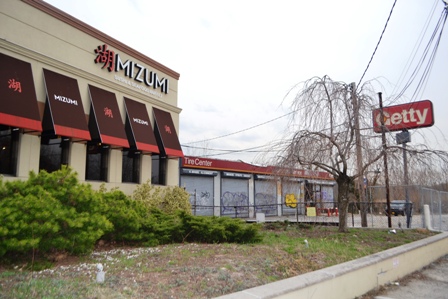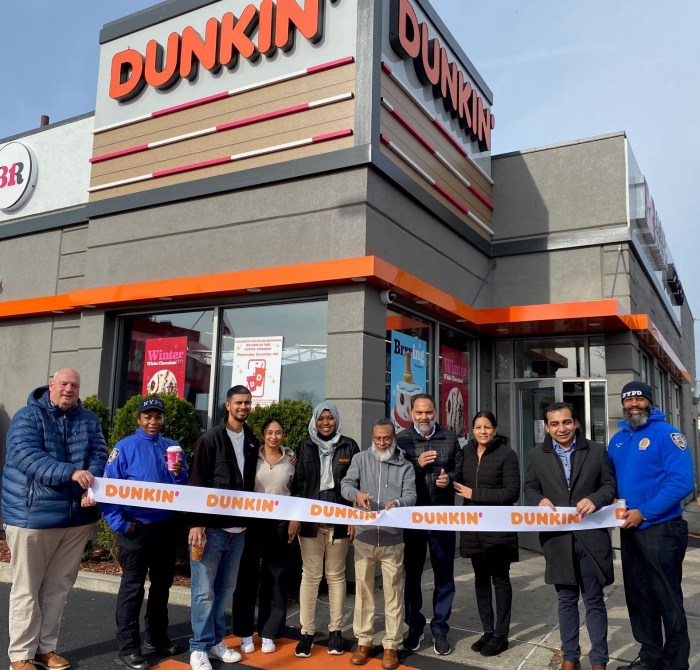Frank St. Jacques of Akerman LLP discussed the details and features around a proposed expansion of Mizumi restaurant on Northern Boulevard in Little Neck during a public land use hearing on May 17. He also addressed the issues and concerns posed by Community Board 11 members, who previously denied the proposal during their May 2 board meeting.
The proposed expansion would add an extra 15,834 square feet to the restaurant, increasing its total to 22,910 square feet.
According to St. Jacques, there are multiple benefits to this proposed commercial overlay. Among the benefits are that it would ensure certainty, promote predictable commercial use and encourage investment in low-density commercial businesses.
“We believe it would promote continuity instead of on an ad hoc or a site-by-site basis,” St. Jacques said. “It would ensure certainty and promote predictable growth, subject to zoning regulations rather than contingent on the variance findings such as the site’s uniqueness and economic hardship.”
The construction for the proposed expansion would be flood resilient, with New York State Department of Environmental Conservation-approved stormwater management and vapor mitigation systems installed around the property. The entire zoning lot is surrounded by bioretention planters with overflow structures and a solid storm drain collector also located within the zoning lot. There is a filtered downspout on the roof and an underground detention chamber that can hold up to 141,581 gallons of water.
There would be approximately 183 delineated parking spaces at the site, but that could increase to as many as 250 spaces with valet parking. Due to the fact that the area has never been zoned for commercial use, many of the variance terms were extended for decades, ranging from as early as 1929 to as recently as 2010.
St. Jacques also addressed concerns previously expressed by Community Board 11 regarding the zoning request. When the board listened to the zoning request during their May 2 meeting, members unanimously denied the proposal due to a multitude of concerns. Members felt a Board of Standards and Appeals (BSA) variance would have been more appropriate and are worried about spot zoning and a loss of control over the development.
The members felt the rezoning should instead be for parkland for Alley Pond Park and were concerned that higher-density zoning would come next.
When addressing the BSA variance, St. Jacques argued R1-2/C2-2 zoning would provide comprehensive controls on potential developments within the rezoning area and that relying on ad hoc variances isn’t a sound planning rationale. In addressing concerns over a loss of control over the development, St. Jacques said that while variance approval is based on findings from the BSA and not the board, the BSA isn’t issuing variances for this type of development.
In arguing against the idea that the rezoning area is parkland, St. Jacques pointed out that a boundary was established in 1981 and the city doesn’t currently have any plans of acquiring the proposed expansion area.
During the hearing, St. Jacques also assured Queens Borough President Donovan Richards that spot zoning should not be a concern because the whole area, including Mizumi, is subject to the R1-2/C2-2 zoning controls on permitted uses and bulk. Finally, he attempted to tamper down concerns about higher-density zoning by explaining that the City Council or BSA must approve any further action beyond the proposed zoning expansion.
Despite St. Jacques attempting to satisfy concerns from Community Board 11, some members who tuned in to the public land use hearing reiterated their opposition to the project. According to Community Board 11 members Roy Giusetti, Henry Euler and Paul DiBenedetto, the area should instead be green space as part of Alley Pond Park.
“The current applicants, including the owners of Mizumi restaurant, who are requesting the zoning change, do not wish to attempt to seek a variance in order to construct an addition to their business,” Euler said. “They claim it’s too expensive and difficult to obtain. The businesses want to bypass the BSA and the public input that allows for variances to be considered.”


































